The 100th anniversary of the First World War is now finished but the records will continue to be preserved at the Archives and accessible to current and future generations who want to know more about the time period. In addition, this blog will remain on our website as an additional resource.
September 2014 Posts:
- 29 September: “Boys, Our Hearts Are With You”
- 22 September: Search Tip: How to use the Keystone database for First World War research
- 15 September: Soldiers’ wills
- 8 September: Unanticipated impacts
- 2 September: Answering the Call of the Motherland
29 September 2014
“Boys, Our Hearts Are With You”
The song "Boys, Our Hearts Are With You" was composed by Loreley Mills in 1916 and performed by the Khaki Girls of Winnipeg. The sheet music is here at the Archives. During the First World War the Khaki Girls performed for troops stationed at Camp Sewell as part of the Women's Volunteer Reserve. The Khaki Girls are pictured on the cover of the sheet music.
Incidentally, Camp Sewell was re-named Camp Hughes in 1915 and is located 10 km west of Carberry, MB. It served as a training camp during the First World War and is now a national historic site.
Search Tip: Search “Khaki Girls of Winnipeg” in Keystone for more information.
Feedback (0)
E-mail us at [email protected] with a comment about this blog post. Your comments may be included on this page.
22 September 2014
Search Tip: How to use the Keystone database for First World War research
In an earlier blog post, we included search tips for finding records related to the First World War in our Keystone database.
You can try limiting a keyword search by the dates of the war in the advanced search for archival descriptions. For example, if you’re interested in women’s roles during the First World War, you could use “women” as a keyword and insert “1914-1918” or “1914-1919” in the date range.
You could search the keyword “war” and use “1914-1918” or “1914-1919” as the date range in the advanced search for archival descriptions. This would save you from searching all the different names for the First World War.
You can use the date range in the listings/images database. A search for the keyword “war” and the date range “1914-1919” provides some interesting results. Many of these records relate to the First World War, but the results also include photographs of a tug of war in 1918.
Finally, don’t forget to search the Keystone database regularly. We’re constantly entering more descriptions and listings. Right now we’re focusing on records related to the First World War. Until that work is done, there are more records in our holdings which you can explore in person at the Archives or can contact us about. We look forward to seeing and/or hearing from you!
Feedback (1)
E-mail us at [email protected] with a comment about this blog post. Your comments may be included on this page.
Archives of Manitoba
Thank you for your question about your uncle, Charles Joseph McKay. If your uncle lived in Manitoba then it is possible that he might appear in records in our holdings; however, we do not have a master name index to check so some research would be required on your part to determine what we have about him. If you are able to come to the Archives to pursue this research, we can assist you more when you come in with records in our holdings. If you are not able to pursue the research yourself, we have suggestions for research from a distance on our website.
Official military records of people who fought in the First and Second World Wars are within federal jurisdiction and are maintained by the Library and Archives Canada in Ottawa. On their website they explain the process for obtaining copies of military service records and they have a range of online resources you can explore on the topic.
15 September 2014
Soldiers’ wills
The Archives of Manitoba holds Manitoba probate records, including wills and estate files for individuals who died in Manitoba. They are often consulted by family members looking for information about their ancestors. Probate records are also a great resource for broader research of individuals and families over the course of Manitoba’s history, including Manitobans killed in the First World War.
Shown here are three pages from the probate file for Alexander Gold. Two are letters written to his mother telling her of his death, from Lieutenant Jack M. McEachern and from Private William Hunter who fought alongside him. The other is Gold’s will, glued to a piece of paper, together with another piece of paper showing his handwriting, submitted as ‘exhibit A’ in the file. These documents were used as proof of his death in the process of probating his will.
If you are interested in finding out more about wills at the Archives of Manitoba, have a look at our Guide to Probate Records. Included are name indexes for most regions in Manitoba – more will come as they are completed. The index for St. Boniface was added in June.
Search Tip: See the Guide to Probate Records on our website for more information on researching wills in Manitoba.
Feedback (0)
E-mail us at [email protected] with a comment about this blog post. Your comments may be included on this page.
8 September 2014
Unanticipated impacts
Information about the impacts of the First World War can be found in unanticipated places. For instance, this letter about marine insurance and war risks from Hudson’s Bay Company Secretary F. C. Ingrams to Stores Commissioner, H. E. Burbidge, is part of a series called “Correspondence with Stores Commissioners” dated 1890-1923. Most of the series is made up of correspondence concerning the management and operations of HBC saleshops, including files on staffing, store accounts, store inspections, and land matters. One might not expect to find a letter outlining the decision to insure against risks incidental to war in a place like this. This is a good reminder that when researching the impacts of the war, you might want to be broad in your research strategies.
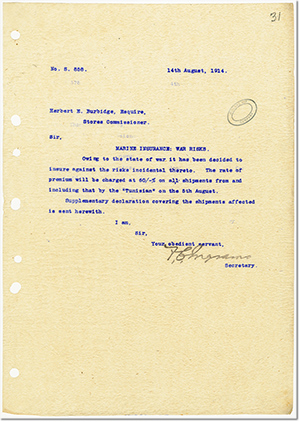
Search Tip: Search “Correspondence with Stores Commissioners” in Keystone for more information.
Feedback (0)
E-mail us at [email protected] with a comment about this blog post. Your comments may be included on this page.
2 September 2014
Answering the Call of the Motherland
This panoramic poster depicts the “Canadian army setting sail to join British forces operating against Germany in the War of Nations.” It was part of a supplement to The Family Herald and the Weekly Star, Montreal, Canada in October, 1914. The poster is approximately 1.1 m x 30 cm and was donated to the Archives by Mrs. William Sandy of Winnipeg, sometime before 1975. The reproduction shown here was created from a black and white negative.

Search Tip: Search “Canada’s Rally to the Empire” in Keystone for more information.
Feedback (0)
E-mail us at [email protected] with a comment about this blog post. Your comments may be included on this page.



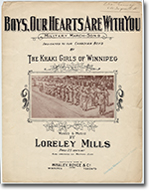
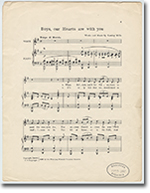
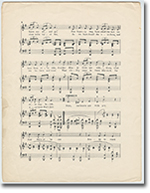
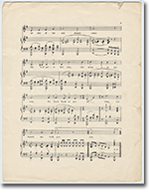
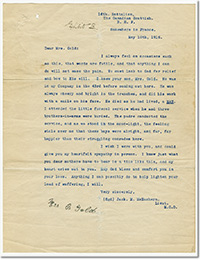
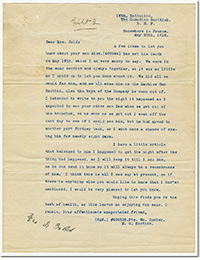
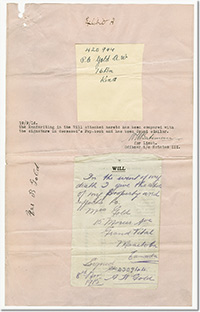

Evelyn September 23, 2014
My Uncle (Charles Joseph Mckay) was in first and second world war he died in 1993 at the age of 98 yrs old, PLEASE LET ME KNOW IF THERE IS Anything thanks